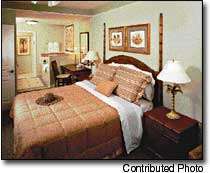The increased numbers of timeshare units on Kaua‘i, now in the neighborhood of 25 percent of all visitor accommodations on the island, is of little concern to hoteliers. “It doesn’t seem to be impacting us,” said Claire Morris-Dobie, Hyatt Regency
The increased numbers of timeshare units on Kaua‘i, now in the neighborhood of 25 percent of all visitor accommodations on the island, is of little concern to hoteliers.
“It doesn’t seem to be impacting us,” said Claire Morris-Dobie, Hyatt Regency Kauai Resort & Spa director of public relations.
“In my opinion, there are many types of travelers. Some people prefer being at bed and breakfasts, some in timeshares, and some enjoy being pampered at hotels,” she said.
“All three are different animals.”
In fact, the continued growth of timeshare units on the island has actually led to higher hotel occupancies and longer lengths of stay by visitors, observed Sue Kanoho, executive director of the Kaua‘i Visitors Bureau.
According to the most recent Hospitality Advisors LLC report, Kaua‘i hotel occupancy was up 25.2 percent in 2003 despite a statewide decrease of about 9 percent from 2002.
The report also indicated that the Kaua‘i hotel inventory has declined more than 15 percent in the past three years as timeshare conversions take rooms off the market.
“Based on our observations of the Kaua‘i market, these numbers seem accurate,” said Kanoho. “Some hotel rooms, such as the new Marriott Waiohai (Marriott’s Waiohai Beach Club), are indeed being converted into timeshare.
“The reduction in hotel-room inventory seems to have driven up the occupancy percentages, since there are less rooms in the pool of inventory to access, therefore, those rooms available seem to be getting higher occupancy than in years past,” she said.
Hospitality Advisors President Joe Toy explains that timeshare sales have removed hundreds of rooms from use by hotels on Kaua‘i.
“Previously, if a timeshare unit was not yet sold, it was rented as a hotel unit and counted as such in my survey until it was sold, e.g. a timeshare property has 300 units, 200 of which were sold as timeshare, 100 still to be sold but rented as a hotel room in the meantime,” Toy said.
“These units were then finally sold, and removed from rentable hotel inventory once all the week intervals were sold.”
In the past two to three years, this process has intensified until timeshare units now make up 25 percent of all visitor accommodations on Kaua‘i and are sold out, Toy commented.
“The timeshare market is having a positive impact on our length of stay, which is one of the goals the Hawai‘i Tourism Authority has given Hawai‘i Visitors and Convention Bureau and the island chapters,” said Kanoho.
In 2002, Kaua‘i had 36 percent of the timeshare market in all of the state (1,641 units).
The decline in numbers of hotel rooms and rise in numbers of timeshare units that has occurred on Kaua‘i hasn’t reached the other islands yet.
Operators of Maui timeshare-conversions hotels, for example, are still selling a lot of their inventory as hotel rooms, Toy said.
Business Editor Barry Graham may be reached at 245-3681 (ext. 251) or mailto:bgraham@pulitzer.net.
Time Share Units – By Island
Kaua‘i – 1,667
Maui – 1,428
O‘ahu – 981
Big Island – 884
Souce: State Department of Business, Economic Development & Tourism


